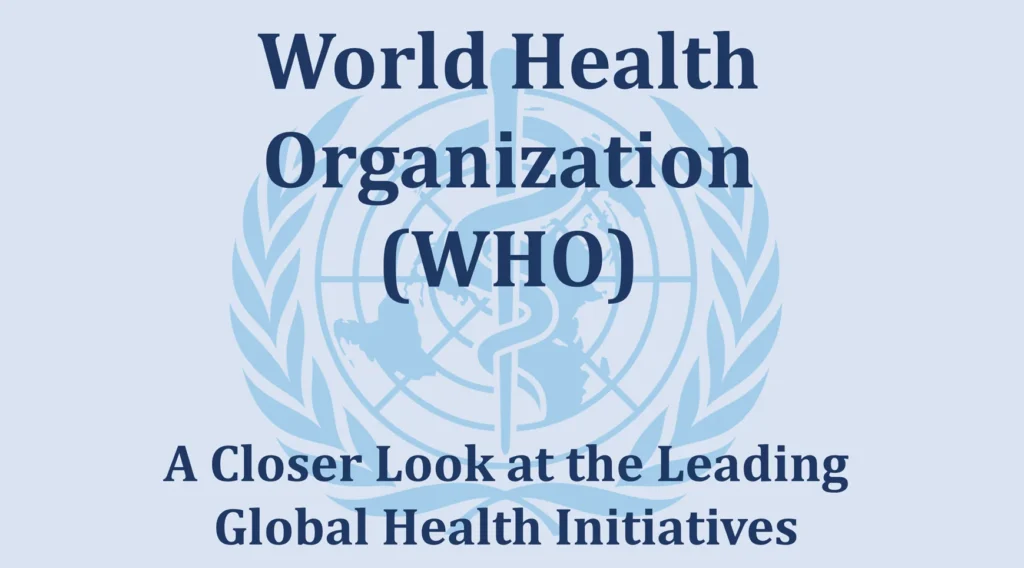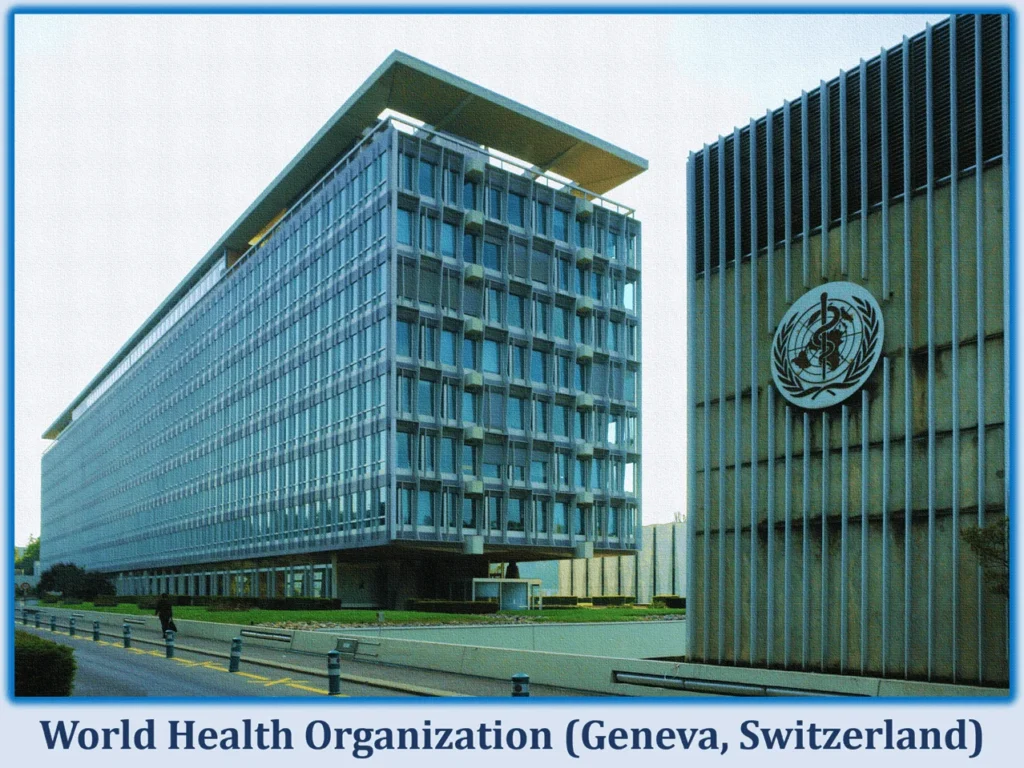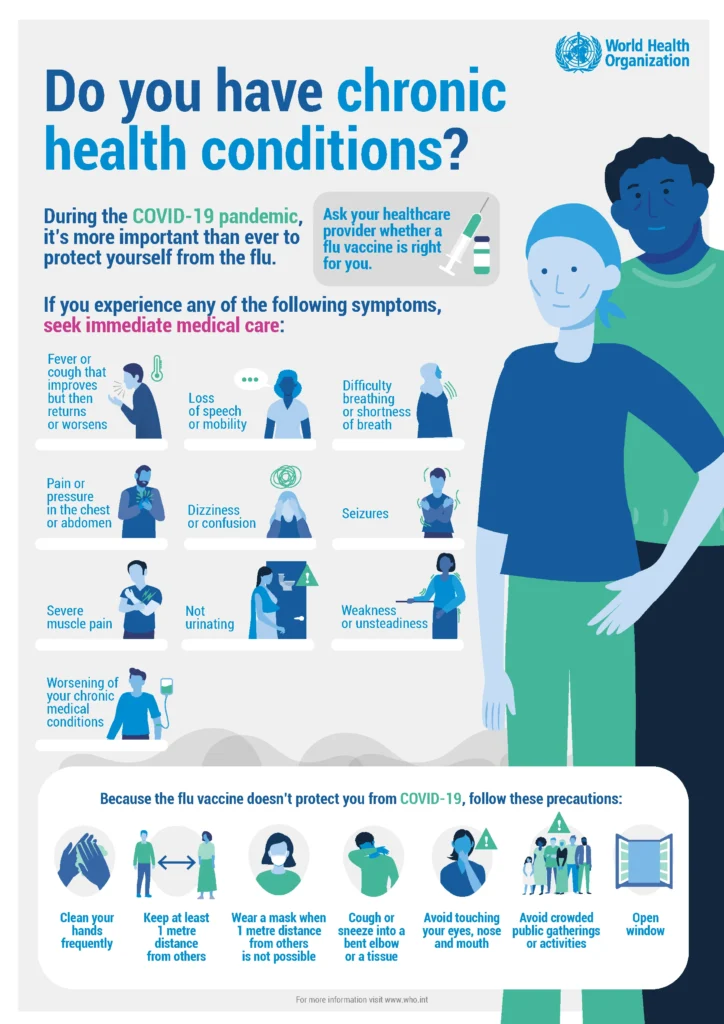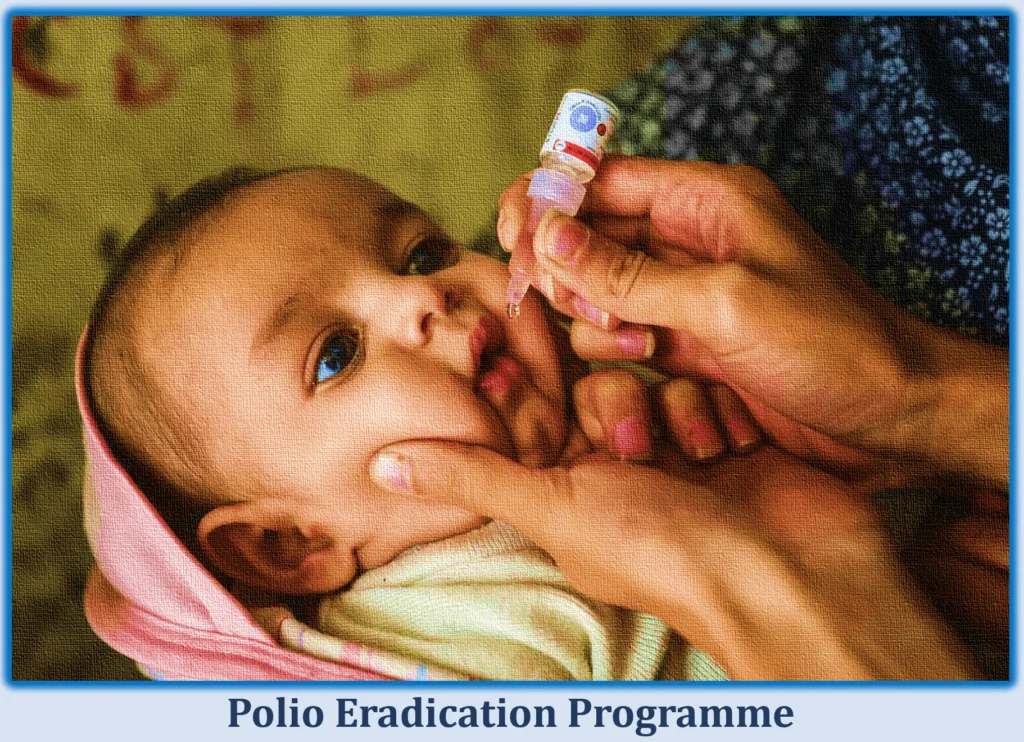
Introduction
The World Health Organization (WHO) is a prominent international organization that plays a pivotal role in shaping global health policies and initiatives. Understanding the functions and contributions of it is crucial in comprehending the broader landscape of public health on a worldwide scale. In this blog post, we will delve into the key aspects of the World Health Organization and explore its significant role in promoting health and well-being globally.
Importance of understanding the role and functions of the WHO
Within the framework of the UN, it acts as the directing and coordinating body for matters pertaining to international health. It sets global health standards, provides technical support, and monitors health trends to address emerging health challenges. Understanding its role is essential for grasping the complexities of global health governance and the interconnected nature of health issues across borders.
WHO’s Primary Functions
- Health Promotion and Disease Prevention: It leads campaigns to raise awareness about health issues and prevent the spread of diseases through vaccination programs and public health initiatives.
- Health Emergency Response: It responds to health emergencies such as outbreaks of infectious diseases, natural disasters, and humanitarian crises, providing critical support to affected communities.
- Health Research and Innovation: It promotes research in the field of health and encourages innovation to address pressing health challenges like antimicrobial resistance and non-communicable diseases.
Key Initiatives of the WHO
- Global Polio Eradication Initiative: It is a key partner in the global effort to eradicate polio, working with countries to vaccinate children and prevent the spread of the disease.
- Tobacco Control Framework: It’s Framework Convention on Tobacco Control sets guidelines for tobacco control policies to reduce tobacco use and protect individuals from the harmful effects of smoking.
- Universal Health Coverage: It advocates for universal health coverage to ensure that all individuals have access to essential health services without facing financial hardship.
“The WHO’s commitment to promoting health equity and addressing health disparities underscores its crucial role in advancing the well-being of populations across the globe.”
History of the WHO
The World Health Organization has played a pivotal role in shaping global health initiatives since its establishment in 1948. Let’s delve into the founding, evolution of mandate, and key milestones of this renowned organization.
Founding and establishment
It was founded on April 7, 1948, with a vision to ensure the highest attainable standard of health for all people. It has its headquarter at Geneva, Switzerland. It emerged as a specialized agency of the United Nations, with a primary focus on international public health. Dr. Brock Chisholm, the first Director-General, emphasized the need for collaboration among nations to combat health challenges collectively.

Evolution of its mandate and scope
Over the years, its mandate has expanded to address a wide range of health issues, including infectious diseases, non-communicable diseases, mental health, and environmental health. It has been at the forefront of global health emergencies, such as the fight against HIV/AIDS, Ebola outbreak, and COVID-19 pandemic. The organization has also been instrumental in developing health policies, setting norms and standards, and coordinating research and resources to improve health outcomes worldwide.
Key milestones and achievements

- Smallpox Eradication: It played a pivotal role in the global eradication of smallpox, marking one of the most significant public health achievements in history.
- Global Vaccine Development: It supports the development and distribution of vaccines to prevent infectious diseases, contributing to improved immunization coverage worldwide.
- HIV/AIDS Response: It has spearheaded efforts to combat the HIV/AIDS epidemic, providing guidance on prevention, treatment, and care for individuals affected by the disease.
It has achieved several significant milestones in its history. Some of the key achievements include the eradication of smallpox in 1980, the near eradication of polio through vaccination campaigns, the development of the Framework Convention on Tobacco Control to reduce tobacco consumption, and the implementation of the Global Malaria Program to combat malaria in endemic regions.
The Structure of the WHO
Overview of the Organizational Structure
It stands as a beacon of global health, championing initiatives that aim to improve the well-being of people worldwide. Founded on April 7, 1948, it operates as a specialized agency of the United Nations. With its headquarters in Geneva, Switzerland, the organization serves as a leader in addressing international public health concerns.
Explanation of the Different Departments and Their Functions
- Executive Office: Responsible for providing strategic leadership and guidance to the organization. The Director-General oversees this office and ensures alignment with its overarching goals.
- Health Systems and Services: Focuses on strengthening health systems worldwide, ensuring equitable access to quality healthcare services, and promoting universal health coverage.
- Communicable Diseases: Addresses the prevention, control, and management of infectious diseases such as HIV/AIDS, malaria, tuberculosis, and emerging pandemics like COVID-19.
- Noncommunicable Diseases: Deals with chronic health conditions like cardiovascular diseases, cancer, diabetes, and mental health disorders, advocating for preventive measures and effective treatment strategies.
- Preparedness, Surveillance, and Response: Works to enhance global health security by monitoring disease outbreaks, coordinating emergency responses, and building capacity for rapid containment and mitigation efforts.
- Health Promotion: Promotes healthy lifestyles, disease prevention, and public health education through advocacy campaigns, community engagement, and policy interventions.
- Family, Women’s and Children’s Health: Addresses maternal and child health issues, reproductive health, and gender equality, advocating for access to essential healthcare services and supporting vulnerable populations.
- Data, Analytics, and Delivery: Utilizes data-driven approaches to inform decision-making, evaluate program effectiveness, and improve health outcomes across diverse populations and settings.
Insight into the Decision-Making Processes within the WHO
It employs a consensus-based decision-making model, wherein member states collaborate to develop resolutions, policies, and guidelines that reflect the collective priorities and values of the global health community. The World Health Assembly serves as the primary platform for decision-making, facilitating dialogue, negotiation, and consensus-building among member states.
Additionally, it’s Executive Board, comprised of 34 elected member states, provides strategic guidance and oversight between WHA sessions, reviewing programmatic activities, budget proposals, and policy recommendations put forth by the Director-General and Secretariat. Overall, it’s decision-making processes emphasize transparency, inclusivity, and accountability, striving to uphold its commitment to advancing health equity and addressing the world’s most pressing health challenges.
The Role of the WHO in Global Health
Initiatives and Campaigns Led by the WHO
It spearheads numerous initiatives and campaigns aimed at improving public health outcomes worldwide. These initiatives encompass a wide range of areas, including disease prevention, health promotion, maternal and child health, and environmental health.
- Immunization Campaigns: It coordinates global efforts to increase immunization coverage and eradicate vaccine-preventable diseases such as polio, measles, and rubella through vaccination campaigns and advocacy programs.
- Tobacco Control: It’s Framework Convention on Tobacco Control (FCTC) serves as a cornerstone for global tobacco control efforts, advocating for tobacco control policies, public awareness campaigns, and cessation programs to reduce tobacco-related morbidity and mortality.
- Global Health Security: It leads efforts to strengthen health systems and build capacity for early detection, rapid response, and containment of infectious disease outbreaks, working collaboratively with member states and international partners to mitigate global health threats.
- Health Equity and Social Determinants of Health: Its initiatives address social determinants of health such as poverty, inequality, and lack of access to healthcare, advocating for policies and interventions that promote health equity and address underlying determinants of disease.
WHO’s Response to Global Health Crises and Emergencies
It plays a pivotal role in responding to global health crises and emergencies, mobilizing resources, expertise, and technical assistance to support affected countries and communities. Recent examples include:

- COVID-19 Pandemic: It led the global response to the COVID-19 pandemic, providing guidance on infection prevention and control, testing, treatment, and vaccine distribution. It also facilitated information sharing, coordinated research efforts, and advocated for equitable access to vaccines and essential medical supplies.
- Ebola Outbreaks: It has responded to multiple Ebola outbreaks in Africa, providing technical assistance, coordinating emergency response efforts, and supporting countries in implementing containment measures, including contact tracing, vaccination campaigns, and community engagement initiatives.
- Natural Disasters and Humanitarian Crises: It provides emergency health services and coordinates humanitarian assistance in response to natural disasters, conflicts, and other humanitarian crises, delivering medical supplies, deploying healthcare personnel, and supporting healthcare infrastructure reconstruction.
Collaboration with Other Organizations and Governments
It collaborates closely with other international organizations, governments, non-governmental organizations (NGOs), and civil society partners to advance global health objectives and maximize impact. This collaboration takes various forms, including:
- Partnerships for Health: It collaborates with a diverse range of partners, including UN agencies, multilateral organizations, philanthropic foundations, academic institutions, and private sector entities, to leverage expertise, resources, and networks in addressing global health challenges.
- Technical Cooperation and Capacity Building: It provides technical assistance, training, and capacity-building support to countries and health systems, strengthening their ability to prevent, detect, and respond to health threats and deliver essential health services.
- Policy Advocacy and Coordination: It engages in advocacy efforts to raise awareness, mobilize political commitment, and galvanize support for global health priorities, advocating for evidence-based policies, resource mobilization, and multisectoral collaboration to achieve health goals.
WHO’s role in global health encompasses leadership in health promotion, disease prevention, emergency response, and health system strengthening, driven by a commitment to equity, solidarity, and collaboration across borders and sectors.
Key Areas of Focus for the WHO
Disease Prevention and Control
Disease prevention and control stand at the forefront of its global health agenda. Through comprehensive strategies and interventions, it aims to mitigate the burden of communicable and noncommunicable diseases worldwide.
- Immunization Programs: It works tirelessly to expand access to life-saving vaccines and immunization services, particularly in underserved communities and low-resource settings. By promoting immunization coverage and combating vaccine-preventable diseases, it contributes significantly to reducing morbidity and mortality rates globally.
- Vector-Borne Disease Control: It leads efforts to prevent and control vector-borne diseases such as malaria, dengue fever, Zika virus, and Lyme disease. Through vector control measures, surveillance systems, and community engagement, it strives to minimize the transmission of these diseases and protect vulnerable populations.
- Tuberculosis (TB) and HIV/AIDS: It advocates for integrated approaches to TB and HIV/AIDS prevention, diagnosis, treatment, and care. By supporting global initiatives like the Stop TB Partnership and the Joint United Nations Programme on HIV/AIDS (UNAIDS), it aims to accelerate progress towards ending the TB and AIDS epidemics.
Health Promotion and Education
Health promotion and education lie at the core of its efforts to empower individuals and communities to take control of their health and well-being. Through targeted campaigns, advocacy initiatives, and capacity-building programs, it promotes healthy behaviors and fosters environments that support health.
- Public Health Campaigns: It develops and implements public health campaigns on diverse topics, including tobacco control, mental health awareness, nutrition education, physical activity promotion, and road safety. These campaigns raise awareness, change social norms, and mobilize action to address pressing public health challenges.
- Health Literacy and Empowerment: It advocates for health literacy as a fundamental determinant of health, enabling individuals to make informed decisions about their health and navigate complex healthcare systems effectively. By promoting health education and literacy programs, the WHO empowers individuals to adopt healthy lifestyles and engage in preventive behaviors.
- Community Engagement and Participation: It emphasizes the importance of community engagement and participation in health promotion efforts, recognizing communities as key stakeholders in addressing health inequalities and driving sustainable change. Through community-based interventions and participatory approaches, the WHO fosters ownership and accountability in health initiatives.
Access to Essential Medicines and Healthcare Services
Ensuring universal access to essential medicines and healthcare services is a central tenet of the WHO’s mission to promote health for all. The WHO advocates for equitable access to affordable, quality-assured medicines and healthcare services, particularly for marginalized and vulnerable populations.
- Essential Medicines Program: It maintains a Model List of Essential Medicines, which serves as a guide for countries to prioritize and procure essential medicines that meet the healthcare needs of their populations. By promoting rational medicine use, quality assurance, and affordability, the WHO facilitates access to essential medicines worldwide.
- Primary Healthcare and Universal Health Coverage: It advocates for the strengthening of primary healthcare systems as a cornerstone of universal health coverage (UHC). By promoting comprehensive, integrated healthcare services that are accessible, affordable, and of high quality, the WHO strives to ensure that everyone can access the health services they need without facing financial hardship.
- Health Equity and Social Determinants of Health: It addresses underlying social determinants of health that contribute to health inequities and disparities in access to healthcare. By advocating for policies that address poverty, gender inequality, discrimination, and other social determinants, the WHO seeks to create enabling environments for equitable access to healthcare services and improved health outcomes.
WHO’s key areas of focus encompass disease prevention and control, health promotion and education, and access to essential medicines and healthcare services, reflecting its commitment to advancing health equity, promoting universal health coverage, and achieving the Sustainable Development Goals. Through collaborative efforts and multisectoral partnerships, the WHO strives to build healthier and more resilient communities worldwide.
Major Achievements and Impact of the WHO
Disease Eradication and Control
- Smallpox Eradication: The World Health Organization’s (WHO) most remarkable feat is the eradication of smallpox, marking the first and only time a human disease has been eradicated globally. Through an intensive vaccination campaign and surveillance efforts, smallpox was officially declared eradicated in 1980, saving millions of lives and demonstrating the power of coordinated global health initiatives.
- Polio Eradication Campaign: The WHO has been instrumental in leading the global effort to eradicate polio. Through vaccination campaigns, surveillance systems, and innovative strategies, the incidence of polio has been drastically reduced. While challenges remain, the WHO’s commitment to polio eradication has brought the world closer to achieving this monumental goal.

Health Promotion and Prevention
- Tobacco Control: The WHO’s Framework Convention on Tobacco Control (FCTC) has catalyzed efforts to reduce tobacco consumption and its associated health risks. The FCTC provides a comprehensive framework for implementing evidence-based tobacco control measures, including tobacco taxes, advertising bans, and smoke-free policies, leading to significant reductions in tobacco use and related diseases worldwide.
- HIV/AIDS Response: The WHO has been at the forefront of the global response to HIV/AIDS, advocating for expanded access to antiretroviral therapy, prevention programs, and comprehensive care and support services. Through its leadership in the Joint United Nations Programme on HIV/AIDS (UNAIDS), the WHO has helped to prevent new HIV infections, improve treatment outcomes, and reduce stigma and discrimination associated with the disease.
Humanitarian Response and Health Security
- Emergency Response and Preparedness: The WHO plays a critical role in coordinating emergency response efforts during health emergencies and humanitarian crises. Whether responding to natural disasters, disease outbreaks, or conflicts, the WHO mobilizes resources, deploys expert teams, and provides technical assistance to affected countries, saving lives and preventing further spread of disease.
- Global Health Security: The WHO leads global efforts to strengthen health systems and enhance preparedness for public health emergencies. Through initiatives like the International Health Regulations (IHR), the WHO helps countries build capacity to detect, assess, and respond to health threats, thereby safeguarding global health security and mitigating the impact of outbreaks and pandemics.
WHO’s major achievements in disease eradication and control, health promotion and prevention, and humanitarian response and health security have had a profound impact on global health outcomes. By leveraging its expertise, partnerships, and resources, the WHO continues to play a vital role in addressing pressing health challenges and advancing the goal of health for all.
Challenges and Criticisms
Funding Issues and Resource Constraints
- Limited Funding: The World Health Organization (WHO) faces persistent challenges related to funding shortages and resource constraints, hindering its ability to effectively address global health priorities and emergencies. Volatile funding streams, unpredictable contributions from member states, and competing priorities often strain the WHO’s operational capacity and limit its ability to scale up essential health interventions.
- Dependency on Donor Funding: The WHO relies heavily on voluntary contributions from member states and external donors, resulting in donor-driven agendas and potential conflicts of interest. Unequal distribution of funding across health programs and regions may exacerbate disparities in health outcomes and undermine the WHO’s mandate to promote health equity and universal access to healthcare services.
Criticisms of WHO’s Response to Certain Health Crises
- Pandemic Preparedness and Response: The WHO has faced criticism for its handling of certain health crises, including delays in declaring public health emergencies and providing timely guidance and support to affected countries. Criticisms of the WHO’s response to the COVID-19 pandemic have centered on issues such as transparency, communication, and coordination of global efforts to contain the spread of the virus and mitigate its impact.
- Ebola Outbreaks and Other Epidemics: The WHO has been criticized for its response to Ebola outbreaks and other epidemics, including concerns about the adequacy of resources, coordination mechanisms, and capacity-building efforts in affected regions. The organization has faced scrutiny over its ability to mobilize timely and effective responses to emerging health threats and to address systemic weaknesses in health systems.
Ongoing Debates about the Organization’s Effectiveness
- Governance and Decision-Making: Ongoing debates persist regarding the WHO’s governance structure and decision-making processes, including questions about transparency, accountability, and representation within the organization. Calls for reform and greater inclusivity in decision-making bodies have underscored the need to strengthen the WHO’s legitimacy and responsiveness to the diverse needs of its member states and stakeholders.
- Adaptation to Emerging Challenges: The WHO faces the challenge of adapting to rapidly evolving health threats and emerging challenges in global health governance. As the landscape of global health continues to evolve, the WHO must remain agile, innovative, and proactive in addressing emerging priorities such as antimicrobial resistance, climate change, and the intersection of health and technology.
World Health Organization confronts a range of challenges and criticisms related to funding, response to health crises, and organizational effectiveness. Addressing these challenges requires sustained commitment from member states, strengthened partnerships with stakeholders, and ongoing efforts to enhance the WHO’s capacity to fulfill its mandate of promoting health for all and advancing global health security.
Future Directions and Innovations
Emerging trends in global health and how the WHO is adapting
The World Health Organization (WHO) has been at the forefront of addressing emerging trends in global health. With the rise of non-communicable diseases, climate change effects, and the ongoing impact of infectious diseases, the WHO has adapted its strategies to meet these new challenges. By focusing on prevention, early detection, and effective treatment options, the WHO continues to play a crucial role in promoting the health and well-being of all populations worldwide.
Potential areas for growth and improvement
As the landscape of global health evolves, the WHO is continuously identifying potential areas for growth and improvement. This includes enhancing collaborations with governments, non-governmental organizations, and other stakeholders to amplify the impact of health initiatives. By prioritizing innovation, research, and data-driven decision-making, the WHO aims to address healthcare disparities and improve health outcomes for vulnerable populations.
Promoting Universal Health Coverage
Universal Health Coverage (UHC) remains a cornerstone of the WHO’s mission. By advocating for equitable access to quality healthcare services without financial hardship, the WHO aims to ensure that no one is left behind. Through its UHC initiatives, the WHO works to empower communities, strengthen health systems, and promote sustainable development goals that prioritize health as a fundamental human right.
Innovations and technologies shaping the future of healthcare and the role of the WHO
Innovations and technologies are revolutionizing the healthcare industry, and the WHO is embracing these advancements to shape the future of healthcare. From digital health solutions to precision medicine and telemedicine, the WHO is leveraging cutting-edge tools to enhance healthcare delivery, improve patient outcomes, and drive progress towards achieving global health objectives. By championing innovation and technology, the WHO is paving the way for a healthier, more sustainable world.
Conclusion & FAQs
Recap of the WHO’s significance in global health
The World Health Organization holds a pivotal role in advancing global health initiatives and promoting health equity worldwide. Through its commitment to evidence-based practices, collaboration, and innovation, the WHO has made significant strides in combating disease outbreaks, addressing health inequalities, and promoting a holistic approach to health and well-being.
Call to action for supporting and engaging with the WHO’s initiatives
We encourage individuals, organizations, and policymakers to support and engage with the World Health Organization’s initiatives. By raising awareness, advocating for policy changes, and giving voice to marginalized communities, we can collectively contribute to the WHO’s mission of building a healthier future for all.
Final thoughts and reflections on the organization’s impact and potential
As we reflect on the World Health Organization’s impact and potential, we recognize the critical role it plays in shaping the future of global health. By staying true to its core values of integrity, transparency, and equity, the WHO continues to inspire hope, drive progress, and lead by example in the field of public health.
Frequently Asked Questions (FAQs)
How is the World Health Organization funded?
The WHO is primarily funded through contributions from member states, partnerships with philanthropic organizations, and donations from private entities.
What are some of the key programs and initiatives led by the WHO?
The WHO leads numerous programs and initiatives, including the Global Polio Eradication Initiative, the Framework Convention on Tobacco Control, and the Global Health Observatory.
How does the WHO collaborate with other international organizations and stakeholders in the health sector?
The WHO collaborates with a wide range of international organizations, including the United Nations, the World Bank, and non-governmental organizations, to coordinate efforts, share resources, and advance global health agendas.
